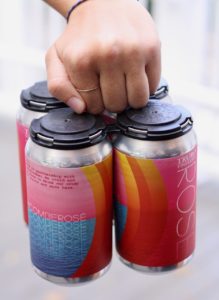
WELLFLEET — Organizers of the Wellfeet OysterFest announced last week that this year’s event will be “plastic free” in response to rising concerns about the environmental impact of single-use plastics.
Lead organizer Michele Insley said of SPAT (Wellfleet Shellfish Promotion and Tasting), the group that puts on the festival, “We’re a nonprofit that supports the shellfishing industry, and we want to create a festival where we have a great time but are also acting sustainably when it comes to our waste.”
Changes at this year’s festival will include serving canned wine, beer, and water instead of beverages in plastic cups or bottles and requiring all vendors to use either compostable or reusable products for food service.
Festival organizers have been working to reduce trash from the event since 2009, when SPAT partnered with the National Marine Fisheries Service and the Wellfleet Wastewater Management Planning Committee to implement shell recycling, removing clam and oyster shells from the solid waste stream and returning the shells to Wellfleet Harbor as part of a habitat restoration effort.
In the years since concern over single-use plastics has intensified locally. “The citizens of Wellfleet have had this desire on their own, organizing from the grassroots level to implement various single-use plastic bans,” said Insley. “We want to be in sync with our host community.”
In recent years the festival has slowly chipped away at its plastic use, swapping plastic beads for wooden ones in the kids’ area, offering refillable water stations, and following the town’s lead on initiatives such as the single-use plastic bag ban and the polystyrene ban. Following a vote at Wellfleet’s 2019 spring town meeting to ban municipal purchase of plastic bottles, SPAT organizers began working to follow suit.
“This year is going to be a big change,” Insley said. For the past decade recycling volunteers at the event have instructed the public on how to sort three waste streams — shells, trash, and recycling. “We’ve been trying to eliminate single-stream recycling because it’s hard to keep uncontaminated,” she added. “This year we’ll still have single stream on Main Street, but inside the festival we’re going to focus on trash, shells, and aluminum cans.”
SPAT has partnered with Open Water, a Chicago-based company, to sell water in aluminum cans at cost to food vendors so they are able to offer water to patrons. In the beer tent Sam Adams will offer four canned beers and an oyster stout, brewed especially for the festival, which will be available for purchase in a reusable 16-ounce stainless steel cup. Truro Vineyards will offer kegged wines for purchase in nine-ounce reusable stainless steel cups as well as a canned rosé.
“It can be hard to change packaging,” said Vineyard co-owner Kristen Roberts, “but we are constantly trying to decrease our carbon footprint, and we are thinking more and more about canned products as we move forward.”
The lead recycling organizer for the festival, Christine Shreves of Wellfleet, said SPAT has partnered with the nonprofit Sustainable Practices of Brewster to sort through cans, and recycling stations will feature new containers with four-inch-square openings to prevent contamination. Sustainable Practices has been behind many of the municipal plastic bottle bans across the Cape and will receive a check from SPAT for the total redemption value of recycled cans.
Changes to food vendor packaging are less clear-cut. The ultimate goal is to move to all compostable packaging and partner with a Truro farmer who is interested in taking the waste.
“Unfortunately he still has some improvements to make in order to get licensed by the state,” said Shreves, adding that composting is “still the plan” long-term. In the meantime, the festival is requiring vendors to make the packaging switch to either reusable or compostable goods this year in an effort to be ready when a compost site does become available.
“The most challenging thing [in working with vendors] is figuring out packaging for soups and hot drinks,” said Shreves. “The only options if you’re using paper are to have a liner of PLA [polylactic acid] or the plastic polyethelyne. PLA has been hard because while it’s not a petroleum product and it is made from plants, it breaks down only in industrial composting facilities.” For the time being these products will still be allowed for use by vendors.
Some vendors will be skipping compostable utensils in favor of ordering reusable metal utensils, said Shreves, and will provide a bucket for customers to return used silverware. “I’d love to mimic festivals in Europe where when you enter you get a reusable plate, a cup, and utensils and bring them back when you leave,” she said, “It’s exciting to see vendors thinking like that.”



